Elon Musk and Vivek Ramaswamy, co-chiefs of the Department of Government Efficiency (DOGE), have issued strong opposition to the proposed stopgap spending bill ahead of the December 20 government shutdown deadline. They argue that the bill, which aims to extend government funding until March 14, is a reckless measure that exacerbates excessive spending and avoids meaningful public scrutiny.

Criticism of Excessive Spending
In a detailed post, Vivek Ramaswamy highlighted the financial implications of the proposed legislation, estimating its cost at $380 billion to keep the government open until mid-March, with additional allocations significantly increasing the total expense. Key spending provisions include:
- Renewal of the Farm Bill for an additional year: $130 billion
- Disaster relief funding: $100 billion
- Stimulus for farmers: $10 billion
- Francis Scott Key Bridge replacement: $8 billion
Ramaswamy noted that the proposal adds 65 cents of new spending for every dollar of discretionary spending, describing the approach as unsustainable. “Debt-fueled spending sprees may ‘feel good’ today, but it’s like showering cocaine on an addict. It’s not compassion, it’s cruelty,” Ramaswamy wrote. He warned of long-term consequences, including rising taxes, foreign acquisitions of farmland, and crippling debt for future generations.
Concerns Over Process and Transparency
Both Musk and Ramaswamy criticized Congress for what they see as a rushed and opaque legislative process. Ramaswamy noted that Congress has been aware of the December 20 deadline since its establishment in September, yet chose to introduce the 1,547-page bill just days before the deadline. This, he argued, undermines thorough public debate and accountability.
“There’s no reason why this couldn’t have gone through the standard process,” Ramaswamy stated, adding, “The urgency is 100% manufactured and designed to avoid serious public debate.” He further suggested that the bill could have been significantly shorter, estimating that a concise version could have been completed in under 20 pages.
Musk shared similar sentiments, posting a photo of the bill’s physical size and calling for constituents to demand transparency from their elected representatives. “Make sure your elected representatives know how you feel about this gigantic spending bill!” Musk wrote, urging public engagement.
Specific Critiques of the Bill
Ramaswamy released a video summarizing the contents of the bill and pointing out provisions he deemed unnecessary or self-serving, including:
- Pay raises for members of Congress
- Expanded federal health benefits for lawmakers
- Funding for a new stadium in Washington, D.C.
- Renewal of the Global Engagement Center
He argued that such allocations, buried within a bill ostensibly aimed at keeping the government open and providing disaster relief, reflect a disregard for fiscal responsibility and a prioritization of special interests over public good.
DOGE’s Position and Call to Action
Both Musk and Ramaswamy framed the bill as an early test for the Department of Government Efficiency. Ramaswamy stated, “This bill should not pass,” and Musk echoed this sentiment in his blunt critique. Together, they urged Congress members to reject the legislation and called on the public to hold their representatives accountable.






